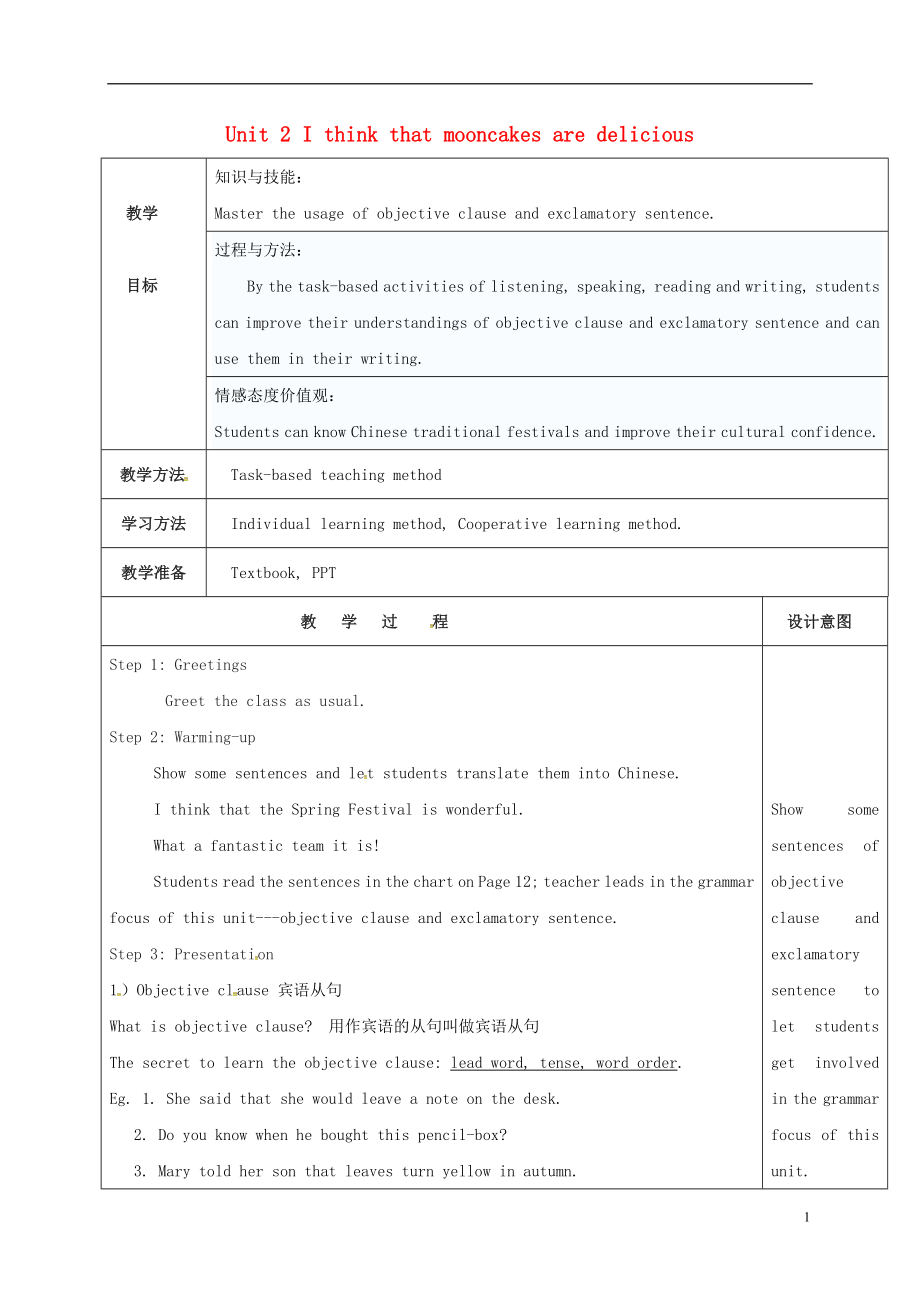《陜西省延安市富縣羊泉鎮(zhèn)九年級英語全冊 Unit 2 I think that mooncakes are delicious 4a-4c教案 (新版)人教新目標版》由會員分享�,可在線閱讀�,更多相關(guān)《陜西省延安市富縣羊泉鎮(zhèn)九年級英語全冊 Unit 2 I think that mooncakes are delicious 4a-4c教案 (新版)人教新目標版(3頁珍藏版)》請在裝配圖網(wǎng)上搜索。
1��、
Unit 2 I think that mooncakes are delicious
教學(xué)
目標
知識與技能:
Master the usage of objective clause and exclamatory sentence.
過程與方法:
By the task-based activities of listening, speaking, reading and writing, students can improve their understandings of objective clause and exclamator
2、y sentence and can use them in their writing.
情感態(tài)度價值觀:
Students can know Chinese traditional festivals and improve their cultural confidence.
教學(xué)方法
Task-based teaching method
學(xué)習方法
Individual learning method, Cooperative learning method.
教學(xué)準備
Textbook, PPT
教 學(xué) 過 程
設(shè)計意圖
Step 1: Greet
3���、ings
Greet the class as usual.
Step 2: Warming-up
Show some sentences and let students translate them into Chinese.
I think that the Spring Festival is wonderful.
What a fantastic team it is!
Students read the sentences in the chart on Page 12; teacher leads in the grammar focus of this un
4����、it---objective clause and exclamatory sentence.
Step 3: Presentation
1)Objective clause 賓語從句
What is objective clause? 用作賓語的從句叫做賓語從句
The secret to learn the objective clause: lead word, tense, word order.
Eg. 1. She said that she would leave a note on the desk.
2. Do you know when he bough
5����、t this pencil-box?
3. Mary told her son that leaves turn yellow in autumn.
Conclusion:
A: 當賓語從句具有陳述意義時��,用that引導(dǎo)�。它在句子中只起引導(dǎo)作用,在口語中??墒÷?��。當斌與從句具有疑問意義時����,可用if或whether引導(dǎo)。它們在句子中的意思是是否����?����;蛘哂眠B接代詞(what,who,which等)或連接副詞(when,where,how,why等)引導(dǎo)���。
B: 賓語從句的時態(tài)一般受主句時態(tài)的影響�����。當主句是一般現(xiàn)在時或一般將來時��,賓語從句可以根據(jù)具體情況用適當?shù)臅r態(tài);當主句是一般過去時
6��、規(guī)劃�����,從句要用相應(yīng)的過去時態(tài)。當主句表示的是名言�,客觀真理或自然現(xiàn)象時���,一般不受主句事態(tài)的限制�����,均用一般現(xiàn)在時�����。
C:賓語從句要用陳述語序����。
2)Exclamatory sentence 感嘆句
用來表達喜怒哀樂等強烈情感的句子叫感嘆句。感嘆句不一般用what或how引導(dǎo)����,句末用感嘆號�。What修飾名詞,how修飾形容詞或副詞����。
1. what引導(dǎo)的感嘆句����。
1) what+adj./adv.+可數(shù)名詞單數(shù)(+主謂語)!
2) what+adj./adv.+可數(shù)名詞復(fù)數(shù)(+主謂語)�����!
3) what+adj./adv.+不可數(shù)可數(shù)名詞(+主謂語)!
2. How引導(dǎo)的感嘆句���。
7��、
How+adj./adv.+主語+謂語!
注意:一般情況下���,what和how引導(dǎo)的感嘆句可以轉(zhuǎn)換�����,轉(zhuǎn)換后意義不變����。
Step 4: Practice
4a: Write sentences using the words given.
4b: Read the passage and underline the objective clauses.
Step 5: Speaking
4c: Which festival do you like best? Ask your group and report to the class.
Eg. In our group, Dav
8、id’s favorite festival is...He thinks that...
Work in pair and make conversations.
A: Which festival do you like best?
B: I think I like the id-autumn best.
A: Why do you like it best?
B: I think I can enjoy delicious mooncakes.
Step 6: Summary and homework
Show some sentences of ob
9、jective clause and exclamatory sentence to let students get involved in the grammar focus of this unit.
By learning the grammar rules and practicing, students can master them better.
板書
設(shè)計
Unit 2 I think that mooncakes are delicious! 4a-4c
Grammar focus:
1: Objective clause 賓語從句
lead word, tense, word order
2: Exclamatory sentence 感嘆句
1) . what引導(dǎo)的感嘆句���。
A: what+adj./adv.+可數(shù)名詞單數(shù)(+主謂語)����!
B: what+adj./adv.+可數(shù)名詞復(fù)數(shù)(+主謂語)�����!
C: what+adj./adv.+不可數(shù)可數(shù)名詞(+主謂語)���!
2). How引導(dǎo)的感嘆句����。
How+adj./adv.+主語+謂語!
教
后
反
思
3
 陜西省延安市富縣羊泉鎮(zhèn)九年級英語全冊 Unit 2 I think that mooncakes are delicious 4a-4c教案 (新版)人教新目標版
陜西省延安市富縣羊泉鎮(zhèn)九年級英語全冊 Unit 2 I think that mooncakes are delicious 4a-4c教案 (新版)人教新目標版

